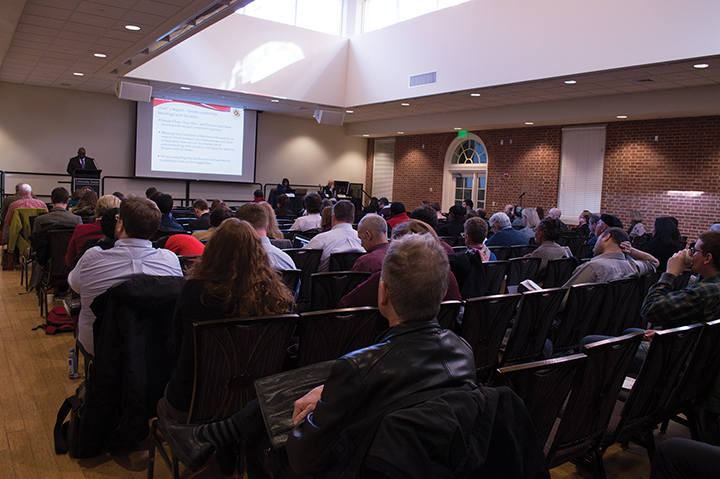More than a month before its official deadline, the University of Maryland Senate’s Campus Affairs Committee unanimously voted down a campuswide ban of hate and intimidation symbols.
The body voted to reject this ban on Feb. 7, while its official deadline is March 30.
The Senate Executive Committee requested in October that the Campus Affairs Committee consider banning symbols of hate and intimidation — anything that is viewed as offensive to a group of people or an individual, such as swastikas and nooses — from all campus facilities. This came two months after the Department of Intercollegiate Athletics adopted changes to its “Fan Code of Conduct,” prohibiting items depicting symbols or words that may intimidate or threaten members of the campus community
[Read more: UMD officials say a campuswide ban of hate symbols would limit First Amendment rights]
Gene Ferrick, chair of Campus Affairs Committee, said the group voted down the proposal, as it was a violation of the First Amendment, months after University Police Chief David Mitchell and the Deputy General Counsel and Chief of Staff Diane Krejsa stated this conclusion in October. Ferrick said the committee also spoke to Mitchell, the Office of Civil Rights and Sexual Misconduct and the Joint President/Senate Inclusion and Respect Task Force in making the decision.
The group also held forums for students, faculty and staff during the fall semester so members of the campus community could share their opinions on the ban.
“We talked with or worked with individuals from the Joint President/Senate Inclusion and Respect Task Force,” Ferrick said. “Gathering all this information, we tried to come up with, go through any possible way that we could ban hate symbols, noose, things like that. And we just felt like that we couldn’t because of freedom of speech, and in effect we would be looking at legal issues if we had such a ban.”
[Read more: With hate symbol ban not possible, UMD Senate considers alternatives]
This university prohibits intimidating or threatening conduct, including acts motivated by hate or bias that target a specific person or group of people, according to the Code of Student Conduct.
While this is a public university, campus stadiums are private facilities, and this distinction allows stadiums to ban objects deemed offensive or disruptive, Ferrick said. The stadiums do not ban speech, he said.
“The task force is developing a principles and values statement for the university that should be ingrained into the experience of each member of the campus community and reinforced throughout their time at the institution,” said University Senate Director Reka Montfort. “Members of our campus community come from different backgrounds and perspectives so it is important that we are clear about our community’s shared values in order to convey what it means to be a Terp.”
The Senate committee also examined policies of all Big Ten universities and found none of these institutions ban symbols or objects from being on the campus, according to the group’s final report.
The task force — established in fall 2017 and made up of 18 staff members, faculty and students — was developing a similar proposal while the Campus Affairs Committee considered the bill, said committee coordinator Aaron Tobiason. It is working on a policy prohibiting intimidating or threatening conduct motivated by bias and plan to define prohibited conduct, clarify where to report misconduct, and how to process the reports, according to the task force.
“[The Campus Affairs Committee] was very encouraged, but ultimately their decision was not predicated by the task force,” Tobiason said, adding that the task force will continue working on its own proposal.
The task force is expected to have a final report by April 24.



